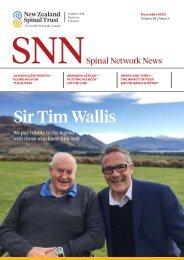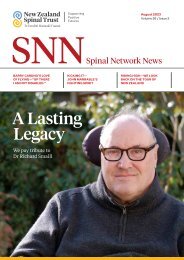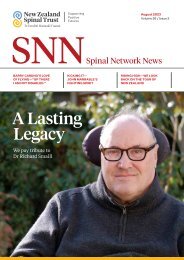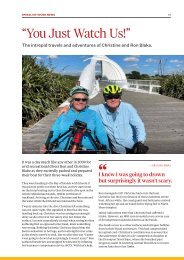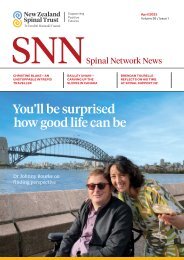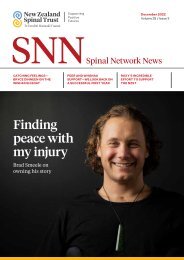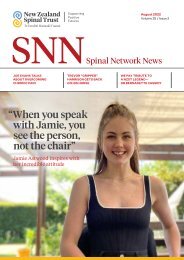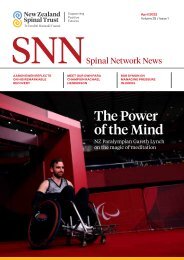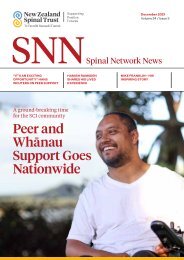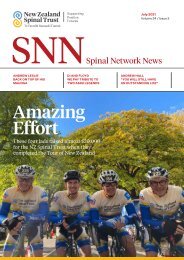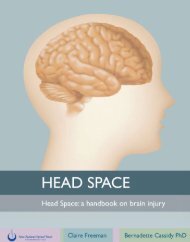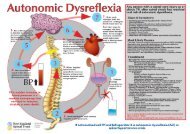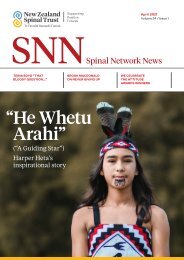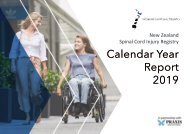SNN July 2018
A.J. Poua personal trainer in a wheelchair Attitude employee award BNZ Crusaders visit NZSCIR registry Welcome backpack Wheelie Good Tips Bayfair Festival of Disability Sports Bailey Unahi Outward Bound Jazz on fitness Lynda Scott 49 yrs in a chair
A.J. Poua personal trainer in a wheelchair
Attitude employee award
BNZ Crusaders visit
NZSCIR registry
Welcome backpack
Wheelie Good Tips
Bayfair Festival of Disability Sports
Bailey Unahi Outward Bound
Jazz on fitness
Lynda Scott 49 yrs in a chair
Create successful ePaper yourself
Turn your PDF publications into a flip-book with our unique Google optimized e-Paper software.
IMPROVING OUR<br />
UNDERSTANDING OF SPINAL<br />
CORD INJURIES<br />
Every year in New Zealand approximately 150 people are diagnosed with spinal cord impairment (SCI) through injury,<br />
medical or congenital causes.<br />
While life expectancy has improved for people with SCIs, the impairment brings with it progressive complexity for people’s<br />
lifelong self-management of it.<br />
To gain a deeper understanding of SCIs the New Zealand Spinal Cord Injury Registry (NZSCIR) was launched in August<br />
2016. Every admission since then to New Zealand’s two spinal units – the Burwood Spinal Unit, part of Canterbury District<br />
Health Board (DHB), and the Auckland Spinal Rehabilitation Unit, part of Counties Manukau District Health Board – has<br />
been added to the database if the patient consents.<br />
The registry collates a person's demographic information (age, date of injury, gender, location, ethnicity, etc.) and clinical<br />
data (level and type of injury, admission and discharge dates, complications etc.) for their acute (straight after injury/incident)<br />
and rehabilitation phases. Participants are followed into the community, with questionnaires completed at one, two and five<br />
years and then every five years after their initial SCI.<br />
NZSCIR Burwood Clinical Director Raj Singhal said: “NZSCIR is probably one of the most important milestones in<br />
management of SCI patients in New Zealand. It is a dream come true for some of the senior colleagues. The scope of<br />
the registry is immense. It gives us the true incidence of SCI in New Zealand to compare our results with international<br />
community and it can be used for research and funding bodies alike.”<br />
Having data on the course of the impairment throughout someone’s life, the prevalence of SCIs and how they occurred<br />
can help researchers who meet the data access criteria, and clinicians, understand trends and where preventative measures<br />
should be concentrated. For instance, if SCIs were occurring at a high rate from older people falling out of hospital beds,<br />
introducing guard rails could help stop this.<br />
According to Dr Richard Smaill, who was a strong advocate in the register’s development, “following people as they age with<br />
the SCI is just crucial for research, clinical treatment and improving the overall wellbeing of people with SCI”.<br />
New Zealand is using the Canadian-based Rick Hansen Spinal Cord Injury Registry (RHSCIR), which began in 2004, and has<br />
over 6,000 patients registered.<br />
New Zealand is the first international site to collect information on the RHSCIR, with other international sites in China and<br />
Israel also enrolled.<br />
Richard said they are keen to add people with SCIs before last August to build up the database if funding allows. Raj said<br />
the coordinator role for the registry is the key to its success and will also need adequate funding in the future.<br />
The DHB continues to collaborate with the Rick Hansen Institute and is extremely grateful for their generous support in<br />
establishing and maintaining the NZSCIR. More information and statistics from the NZSCIR will be placed on the NZ Spinal<br />
Trust website www.nzspinaltrust.org.nz in the coming months.<br />
If you have any queries about the registry please contact Burwood NZSCIR Coordinator Tracey<br />
Croot on 03 383 7559 or at NZSCIR@cdhb.health.nz.<br />
11



